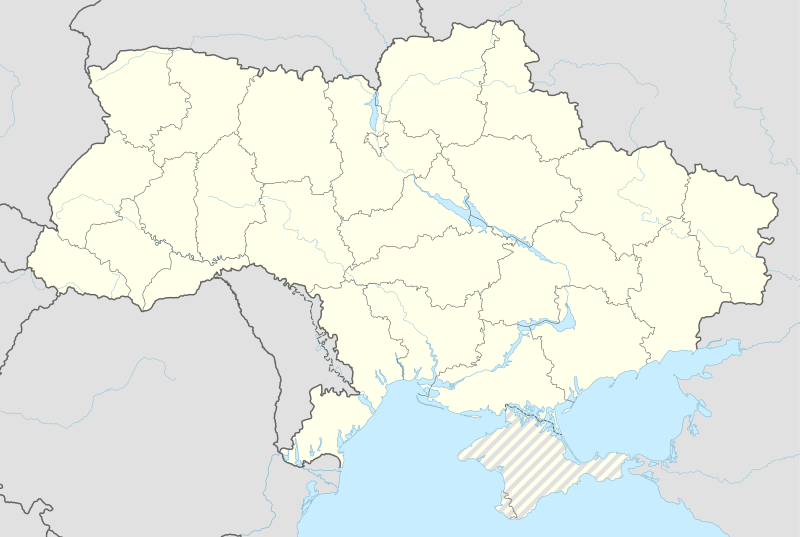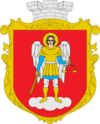Ovruch
| Ovruch Овруч | |||
|---|---|---|---|
| City of district significance | |||
|
Historic building in town's centre | |||
| |||
 Ovruch Location of Ovruch in Ukraine | |||
| Coordinates: 51°19′28″N 28°48′29″E / 51.32444°N 28.80806°ECoordinates: 51°19′28″N 28°48′29″E / 51.32444°N 28.80806°E | |||
| Country |
| ||
| Oblast |
| ||
| Raion |
| ||
| Founded | 946 | ||
| City rights | 1641 | ||
| Area | |||
| • Total | 9 km2 (3 sq mi) | ||
| Elevation | 149 m (489 ft) | ||
| Population (2013) | |||
| • Total | 16,614 | ||
| Postal code | 11100 | ||
| Area code(s) | +380 4148 | ||
| Website | Official website | ||
Ovruch (Ukrainian: Овруч, Russian: О́вруч, Polish: Owrucz, Yiddish: אוורוטש) is a city in the Zhytomyr Oblast (province) of northern Ukraine. It is the administrative center of the Ovruch Raion (district). It has a population of 16,614 (2013 est.)[1] and is home to Ovruch air base.
History
Ovruch originated as an important town of Kievan Rus, first mentioned as Vruchiy in 977. Later after the sack of Iskorosten it became the capital city of Drevlian.[2] In the 14th century it became part of the Grand Duchy of Lithuania. In 1483, Crimean Tatars destroyed the settlement. According to the Treaty of Lublin (1569), Volhynia with Owrucz formed a province of the Polish-Lithuanian Commonwealth. In 1641, Polish King Władysław IV Vasa granted Owrucz city rights. It was a royal city of Poland. After the Second Partition of Poland in 1793 it was annexed by the Russian Empire.
The only mark of the town's antiquity is St. Basil's Church, commissioned by Rurik II of Kiev from his court architect Pyotr Miloneg in the late 1190s. The church was built in Rurik's votchina and was dedicated to his patron saint.
Geography
Located in northwestern Ukraine, 50 km south of the Belarusian border, Ovruch is part of the geographical region of Polesia. It is 48 km far from Korosten, 133 from Zhytomir, 92 from Mazyr, in Belarus; and 100 from the ghost town of Pripyat, nearby Chernobyl Nuclear Power Plant.
Architecture

St. Basil's Church has four pillars, three apses and one dome. The western facade is flanked by two round towers, probably in imitation of the Saint Sophia Cathedral in Kiev. The building is distinguished by elaborate brick facades, interlaced with bands of polished colored stone. The complicated design of pilasters points to a complex system of roofing and to a very high dome. The dome and vaults collapsed during the siege of Ovruch by Gediminas in 1321. The ruins of the church survived until 1842, when they crumbled, with the exception of three apses and a portion of the northern wall with an arch.
In 1907 Aleksey Shchusev was commissioned to restore the church to its presumed original form, incorporating the remains of Rurik's church into his edifice. Restoration works lasted for two years and won Schusev the prestigious title of the Academician of Architecture. More recently, the accuracy of his restoration has been questioned, as it did not take into account the complicated system of vaulting and the considerable height of the drum. As a consequence of this oversight, the drum was restored according to a model characteristic of more archaic churches rather than for the turn of the 13th century. Adjacent buildings of St. Basil's Convent were built on the model of medieval architecture of Pskov simultaneously with the restoration of the main church.
Climate
| Climate data for Ovruch (1961–1990) | |||||||||||||
|---|---|---|---|---|---|---|---|---|---|---|---|---|---|
| Month | Jan | Feb | Mar | Apr | May | Jun | Jul | Aug | Sep | Oct | Nov | Dec | Year |
| Daily mean °C (°F) | −6.2 (20.8) |
−4.8 (23.4) |
−0.1 (31.8) |
7.7 (45.9) |
14.2 (57.6) |
17.1 (62.8) |
18.1 (64.6) |
17.3 (63.1) |
12.8 (55) |
7.1 (44.8) |
1.5 (34.7) |
−2.9 (26.8) |
6.8 (44.2) |
| Average precipitation mm (inches) | 40 (1.57) |
35 (1.38) |
34 (1.34) |
45 (1.77) |
52 (2.05) |
81 (3.19) |
96 (3.78) |
71 (2.8) |
52 (2.05) |
39 (1.54) |
50 (1.97) |
46 (1.81) |
641 (25.24) |
| Source: NOAA[3] | |||||||||||||
Personalities
- Vladimir Bogoraz (1865-1936), revolutionary, writer and anthropologist
- Stefano Ittar (1724-1790), Polish-Italian architect
- Oleksandr Lavrynovych (b. 1956), physicist, lawyer and politician
- Yuri Nemyrych (1612–1659), politician of the Polish-Lithuanian Commonwealth
Gallery
 Ovruch railway station
Ovruch railway station St. Basil Church - modern view
St. Basil Church - modern view Ovruch in Winter
Ovruch in Winter- Transfiguration Church in Ovruch
See also
References
- ↑ "Чисельність наявного населення України (Actual population of Ukraine)" (in Ukrainian). State Statistics Service of Ukraine. Retrieved 21 January 2015.
- ↑ Mykhailo Hrushevsky. History of Ukraine-Rus.
- ↑ "Ovruc (Ovruch) Climate Normals 1961-1990". National Oceanic and Atmospheric Administration. Retrieved September 29, 2016.
- Памятники градостроительства и архитектуры Украинской ССР. Kiev, 1983-86. Vol. 2, page 153 (online)
External links
| Wikimedia Commons has media related to Ovruch. |

